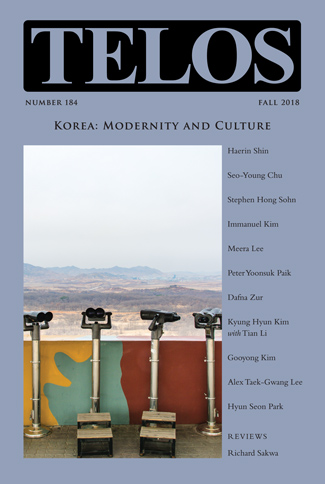By Dafna Zur · Friday, November 16, 2018 Dafna Zur’s “You Can’t Write ‘Pak’ on Television: Language as Power in Hebrew K-pop Fandom” appears in Telos 184 (Fall 2018), a special issue on Korea. Read the full article at the Telos Online website, or purchase a print copy of the issue in our online store. Individual subscriptions to Telos are available in both print and online formats.
Korean popular culture first arrived in Israel with the airing of Sweet Samsoon in 2007. What began as a cable channel’s cautious experiment with the tastes of a fan base accustomed to South American telenovelas turned into an unpredictably successful venture. Korean dramas have since appeared regularly both on cable TV and through fansub sites, delivering romantic comedies, action-packed adventures, and historical dramas to their fans. The reception of Korean pop culture in Israel challenges a traditional understanding of its reception around the world since Israel falls neither within the region that has facilitated Korean pop culture’s transnational circulation, nor have Israel and Korea enjoyed an extended political or economic exchange that would facilitate the reception of Korean cultural products.
Continue reading →
By Peter Yoonsuk Paik · Tuesday, November 6, 2018 Peter Yoonsuk Paik’s “The Korean Wave and the Impasse of Theory” appears in Telos 184 (Fall 2018), a special issue on Korea. Read the full article at the Telos Online website, or purchase a print copy of the issue in our online store. Individual subscriptions to Telos are available in both print and online formats.
South Korean popular culture has achieved startling success across much of the globe during the past decade. The first transnational form of popular culture that is not the legacy of an imperial project, the efforts to understand the significance of the “Korean wave” have been hampered by dominant scholarly approaches in the humanities that are not capable of grasping both its emergence and its appeal. This article argues that a key reason for the appeal of South Korean television and film is the fact that they explore the clash between tradition and modernity. South Korean media resonates with peoples across the world who are living out the conflicts between tradition and modernity and are thus eager for models for negotiating the competing demands of the two.
Continue reading →
By Haerin Shin · Monday, September 24, 2018 Telos 184 (Fall 2018), a special issue on Korea, edited by Haerin Shin, is now available for purchase in our store.
 While Korea’s history as a modern nation-state has always been a tumultuous reel of socio-political unrest, never has it drawn the globe’s attention to the degree and extent to which the press coverage of the past two years attests. South Korea’s candlelight demonstrations in the fall of 2016 were widely regarded as a newly arisen form of celebratory civil protest culture, and news of the progressive party’s subsequent rise to power stood out amid the global turn toward conservative politics. Meanwhile, with North Korea’s nuclear threat becoming a palpable reality, media outlets began clamoring with predictions of a major military outbreak across the Pacific. (I remember being inundated by concerned emails from acquaintances abroad during my breaks in South Korea last year.) Then came the dramatic shift toward prospects of denuclearization and North–South collaboration this past summer. Millions watched in awe as Kim Jong Un took President Moon’s hand and walked over the Military Demarcation Line. The meeting in Singapore was viewed with skepticism in the United States, but more pertinently such attempts to reestablish channels of communication were greeted warmly in South Korea. While Korea’s history as a modern nation-state has always been a tumultuous reel of socio-political unrest, never has it drawn the globe’s attention to the degree and extent to which the press coverage of the past two years attests. South Korea’s candlelight demonstrations in the fall of 2016 were widely regarded as a newly arisen form of celebratory civil protest culture, and news of the progressive party’s subsequent rise to power stood out amid the global turn toward conservative politics. Meanwhile, with North Korea’s nuclear threat becoming a palpable reality, media outlets began clamoring with predictions of a major military outbreak across the Pacific. (I remember being inundated by concerned emails from acquaintances abroad during my breaks in South Korea last year.) Then came the dramatic shift toward prospects of denuclearization and North–South collaboration this past summer. Millions watched in awe as Kim Jong Un took President Moon’s hand and walked over the Military Demarcation Line. The meeting in Singapore was viewed with skepticism in the United States, but more pertinently such attempts to reestablish channels of communication were greeted warmly in South Korea.
Continue reading →
|
|



